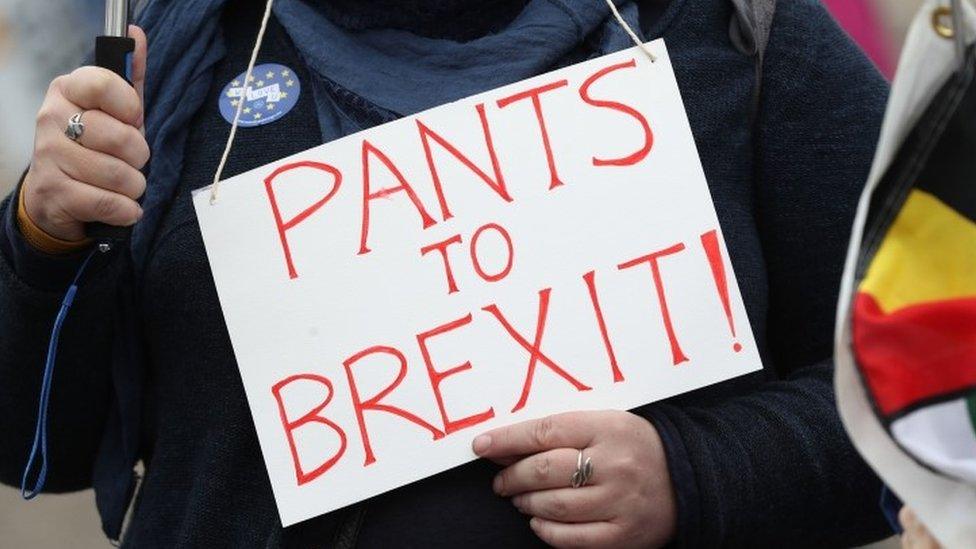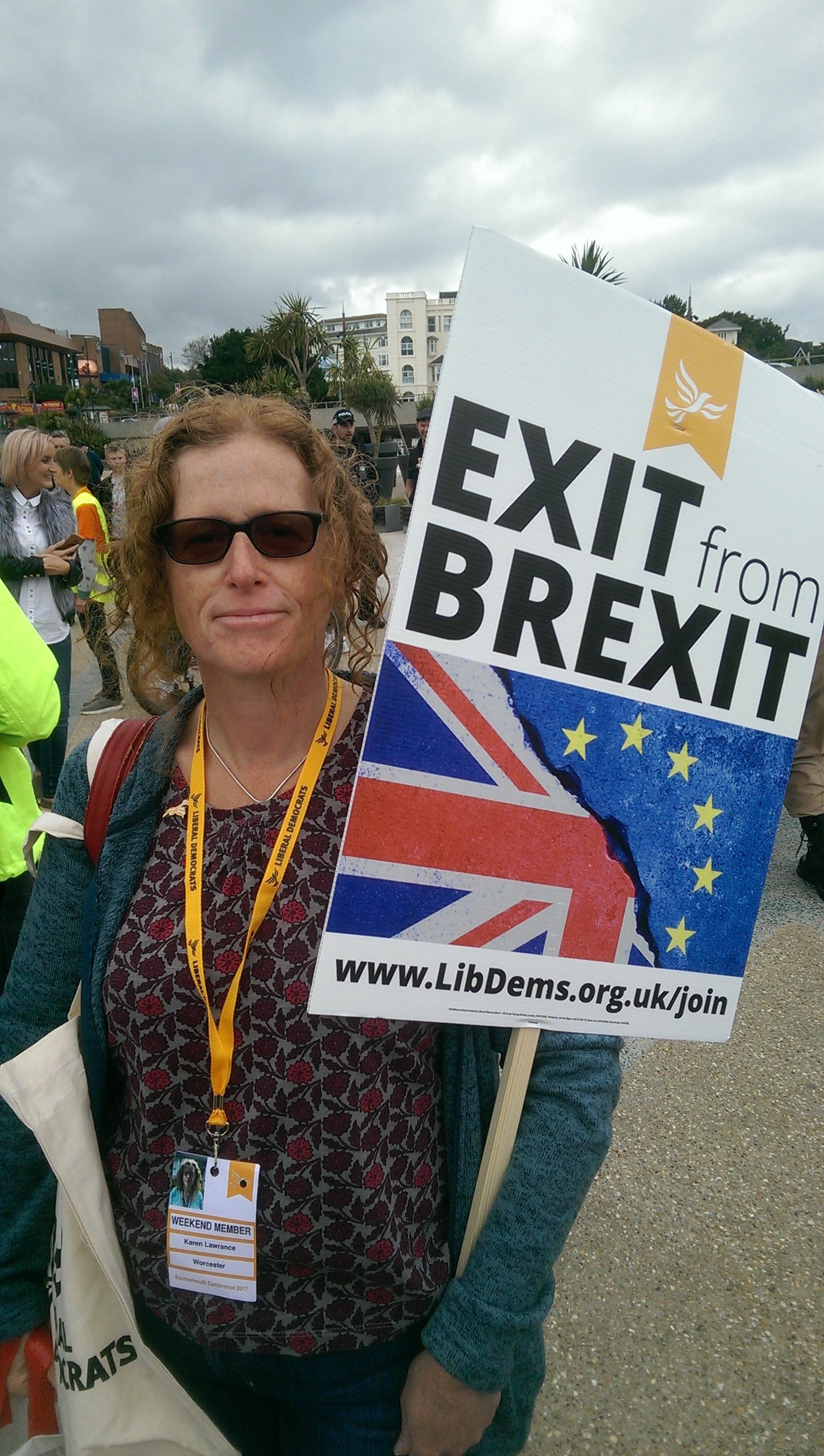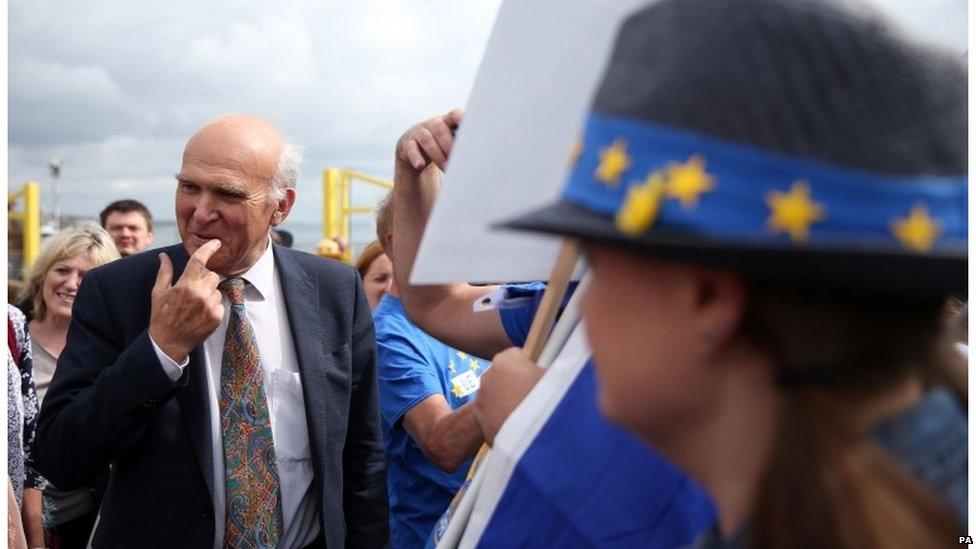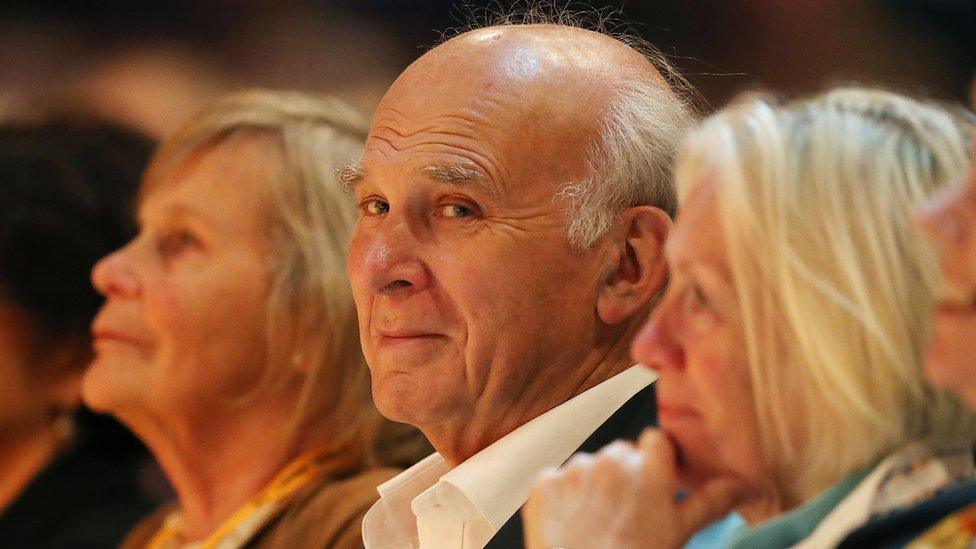How to stop Brexit? Lib Dems mull referendum dilemma
- Published

Pants to Brexit was one of the more eye-catching chants - complete with props to hand - on show during Sunday's pro-EU march here at the English seaside.
Many of those present were wearing berets sporting the EU flag while one held an image of Edvard Munch's famous picture The Scream with the word Brexit superimposed on it.
Charlotte Morrow, a Lib Dem member from Somerset, said politicians had let the people down and she was alarmed by what she suggested was a "Little England" mentality creeping in over the future of EU citizens living in the UK.
"I don't like the rhetoric. I don't like what I see. I don't like that people now feel entitled to say 'leave, you are no longer welcome here.'"
But the mixture of slapstick, cheery defiance and apocalyptic imagery on display at the demo - organised by Dorset for Europe - belied a rather different argument going on nearby about how the UK's exit from the EU can be stopped.
Lib Dem activists overwhelmingly endorsed the leadership's call for the public to have the final say on the final terms of Brexit in the form of what is being dubbed an "exit from Brexit" referendum.
The option of a get-out clause for opponents of Brexit has always been popular among this most pro-European of parties.
It has gained greater traction since the general election result destabilised Theresa May's government and the parliamentary arithmetic of a hung Parliament threw supporters of a soft Brexit a lifeline.
Caron Lindsay, the editor of Lib Dem Voice, tweeted during the debate that it illustrated the unity within the party on opposing Brexit but agreement over the means is slightly less unanimous.
While in a definite minority, those voicing opposition to the idea of another referendum in the conference hall hinted at a wider unease within the party.

Lib Dems like Karen Lawrance says the party must stick to its beliefs
One member warned it was likely to be "toxic" for the 52% of the electorate who had voted to leave while another described it as akin to "flogging a dead horse" given the widely-held view that Article 50 is an irreversible process.
Mick Taylor, a former general election candidate who spoke against the idea, said afterwards while he acknowledged the "groundswell of opinion" in favour of another referendum and would respect the result, he had reservations.
"The problem with referendums is that they detract from the role of MPs. The role of MPs is to be elected on behalf of the people they represent, go to Parliament and make decisions.
While the Calderdale activist wants Lib Dems to oppose Brexit "by all democratic means", he said the logic of holding a referendum on the same subject - albeit with a different premise - was principled but could be flawed.
"I don't think it has anything to do with differentiation. I think it has to do with a genuine belief, which I don't share that having started the process with a plebiscite you need to finish it with one.
"Since Parliament is sovereign, the final decision will ultimately be taken by Parliament anyway. The only thing that a plebiscite will do is delay a decision being taken."
But elsewhere, Sir Vince Cable's insistence that he is not just seeking a replay of the 2016 vote does find favour.

Most Lib Dems applaud Vince Cable for toughening his language on Brexit
"The Lib Dems are united in stopping Brexit, it is just the method being discussed," says Karen Lawrence, from Worcester, who took part in the march.
While she is clear another a referendum won't settle the issue - "I think the country is apart on this issue and will be apart for years and years" - she feels it is an example of the radicalism ex-leader Lord Ashdown has called for in the wake of the underwhelming general election result.
"It is not a second referendum. It is the first referendum on what the deal actually is," she insists.
"We have to stand by what we believe in. We are not about doing what is popular for the whole country but do what is right as far as we are concerned."
For many, including Charlotte Morrow, a second referendum is an opportunity to right a wrong and allow 16 and 17-year olds, as well as EU citizens in the UK and all British expats on the continent, to have their say.
"If I thought it (the 2016 referendum) was fair and everyone here thought it was fair, they would be sat at home having their roast dinner today."
- Published17 September 2017
